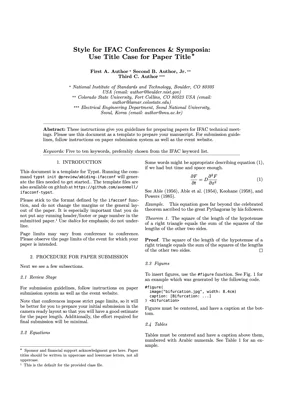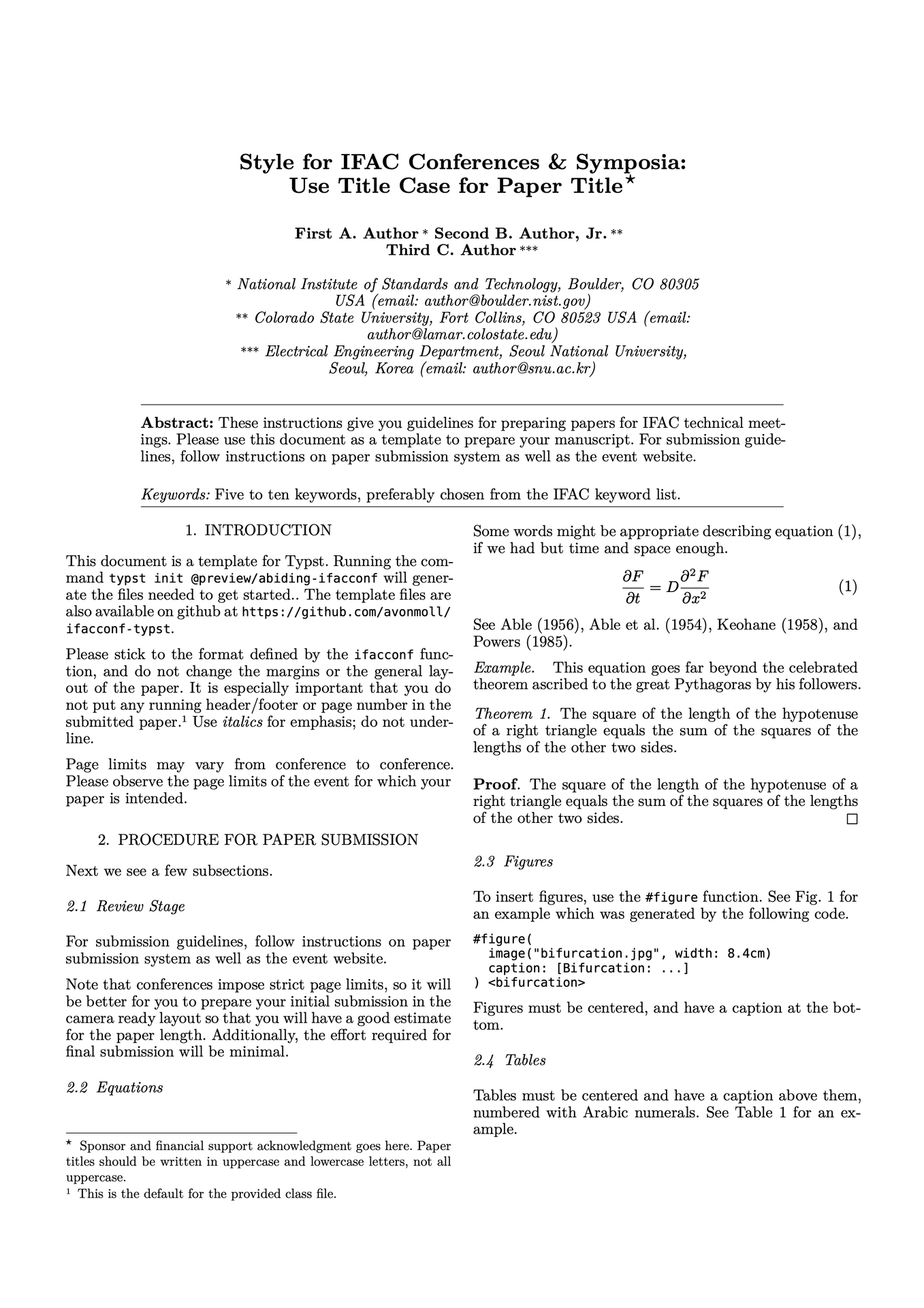Create project in app
(unofficial) IFAC Conference Template for Typst
IFAC stands for International Federation of Automatic Control. This repository is meant to be a port of the existing author tools for conference papers (e.g., for LaTeX, see ifacconf_latex.zip) for Typst.
Usage
Running the following command will create a new directory with all the files that are needed:
typst init @preview/abiding-ifacconf
Configuration
This template exports the ifacconf function with the following named arguments:
authors: (default: ()) array of authors. For each author you can specify a name, email (optional), and affiliation. The affiliation must be an integer corresponding to an entry in the 1-indexed affiliations list (or 0 for no affiliation). For authors with multiple affiliations, use an array of integers. Their email will only be shown on their first affiliation.affiliations: (default: ()) array of affiliations. For each affiliation you can specify a department, organization, and address. Everything is optional (i.e., an affiliation can be an empty array).abstract: (default: none) the paper’s abstract. Can be omitted if you don’t have one.keywords: (default: ()) array of keywords to display after the abstractsponsor: (default: none) acknowledgment of sponsor or financial support (appears as a footnote on the first page)
Minimal Working Example
#import "@preview:abiding-ifacconf:0.2.1": *
#show: ifacconf-rules
#show: ifacconf.with(
title: "Minimal Working Example",
authors: (
(
name: "First A. Author",
email: "author@boulder.nist.gov",
affiliation: 1,
),
),
affiliations: (
(
department: "Engineering",
organization: "National Institute of Standards and Technology",
address: "Boulder, CO 80305 USA",
),
),
abstract: [
Abstract should be 50-100 words.
],
keywords: ("keyword1", "keyword2"),
sponsor: [
Sponsor information.
],
)
= Introduction
A minimum working example (with bibliography) @Abl56.
#lorem(80)
#lorem(80)
#bibliography("refs.bib")
Full(er) Example
See main.typ.
Dependencies
- typst 0.13.0
- ctheorems 1.1.3 (a Typst package for handling theorem-like environments)
Notes, features, etc.
- the call to
#show: ifacconf-rulesis necessary for some show rules defined intemplate.typto get activated ifac-conference.cslis a lightly modified version ofapa.csland is included in order to change the citation format from, e.g.,(Able 1956)toAble (1956)in order to matchifacconf_latex- Tables have formatting rules that get activated inside calls to
figurewithkind: "table"; a convenience functiontablefigis provided which sets this automatically - all theorem-like environments that were available in
ifacconf_latexare defined intemplate.typ; simply call, for example,#theorem[Content...] ... #proof[Proof...] - the LaTeX version does not include a QED symbol at the end of proofs, however one is included here (this is easy to change)
- Typst did not seem to like BibTeX citation keys containing colons (which was how they came from
ifacconf_latex) - alignment for linebreaks in long equations is somewhat manual (e.g., for equation (2) in
ifacconf.typ) but probably there is a better way to handle this now or in the future - the files
refs.bib(essentially) andbifurcation.jpgcome fromifacconf_latex - the file
template/main.typis modeled directly afterifacconf.texby Juan a. de la Puente - the
citepfunction renders citations like(Keohane, 1958)instead of the default style ofKeohane (1958)
License
This template is licensed according to the MIT No Attribution license (see LICENSE.MD).
The files in the CSL folder are licensed according to CSL/LICENSE.md (CC BY/SA 4.0) because it is a lightly modified version of apa.csl by Brenton M. Wiernik which is also licensed by a CC BY/SA license.

